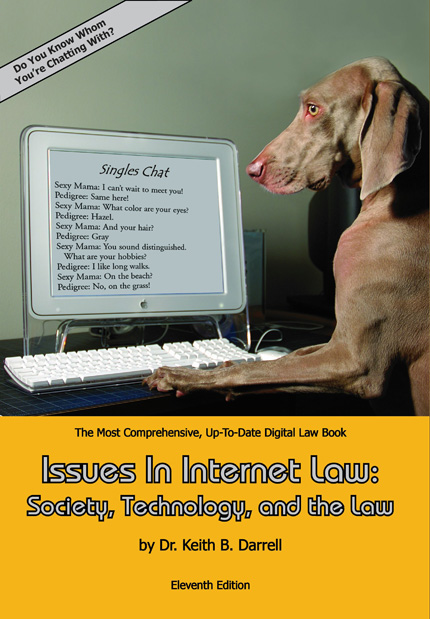
| Professor Paulson's Home Page |
|---|
| Section | Course ID | Class Times | Classroom |
| 01 | 000124 | online | online |
| Instructor | Office | Office Hours | Phone | |
| Pat Paulson | see D2L | Somsen 303 | by appointment in Zoom | 457-5581 |
| Syllabus Check periodically for updates | |
| course files are at \\store\classes\20261000124\ReadOnly | Software Info : not required |
Required: Darrell, Issues in Internet Law-11th edition, 2017
https://www.amazon.com/Issues-Internet-Law-Society-Technology/dp/1935971352/
ISBN-13: 978-1935971351
LinkedIn Learnnig Collection: BUSA331
Use earlier editions at your own risk.
 |
|---|
Recommended reference: Rustad, Global Internet Law in a Nutshell, https://www.amazon.com/Global-Internet-Law-Nutshell-Nutshells/dp/1634596846/
ISBN-13: 978-1634596848
Recommended reference: Patent, Copyright & Trademark: An Intellectual Property Desk Reference,
https://www.amazon.com/Patent-Copyright-Trademark-Intellectual-Reference/dp/1413324622/
ISBN-13: 978-1413324624
Additional materials and equipment:
Laptop Headset (earbuds are OK) for Skype, listening to class recordings, participating in web conference.
An overview and discussion of the current state of the law with respect to computers and internet technology.
Legal topics are analyzed to determine the implications for individuals and businesses.
Consideration is given to the societal effects of these legal trends.
This course is designed to make the students knowledgeable concerning the topic of Internet law.
The focus will be on learning the importance of legal concepts and trends to businesses and individuals.
The current and future state of statutory and case law as it relates to the Internet and the online world will be discussed
.
Areas of concentration will be Intellectual Property, CyberCrime, Privacy, Free Speech, Web Contract Law and Web 2.0+
Class Meetings : There an no required class meetings. The class recordings are available on the syllabus, in the right hand column.
Class Participation Class participation is useful to the student as a means of acquiring knowledge and subject matter clarification. Class participation is the active engagement in problem solving, questions and answers, taking part in analyses of business situations, and contribution of comments. Meaningful class participation, or lack thereof, affects your grade. You can participate by using the D2L discussion forums, using LinkedIn Learning, or viewing the class recordings.
Refer to the class syllabus. Students are expected to read the book chapter and examine the material listed in the "Presentations" column before doing the assignments, which consist of answerings questions on the material for the current chapter.
Refer to the D2L Calendar for due dates. Assignments are completed using
a web browser, and submitted to the professor once the 'Submit' button is
pressed.
Check your assignment submission by pressing the 'Run Assignment Submissions Report' on your website home page.
Hand written, paper or emailed assignments do not look professional and are not acceptable. You will receive none of the possible points for these types of assignment submissions.
If you are having trouble with grammar, spelling or written communications, please seek assistance from the Writing Center.
Project : Each student will submit an original report on an internet legal issue of their choice.
Students are encouraged to work on assignments and projects in informal groups.
The mid-terms and final consist of short answer and possibly essay questions. There may be 'hands-on' problems requiring the use of software applications to solve problems. These exams will be open-book, open notes and available in D2L. Use of any instant messaging or email is not allowed. Students can not share a book during an exam.
If you are having troubles with the class, do not hesitate to contact the instructor. See D2L for details.
More information about the exams will be made available closer to examination time.
Additional exam time will not be given!
Exams cannot be made up.
Please check D2L now and make sure that you are available on the exam date.
10% |
Project (draft + final) |
10% |
LinkedIn Learning courses |
40% |
Assignments (based on total points) |
15% |
MidTerms (based on total points) |
25% |
Final |
Every effort is made to provide timely grading.
Assignments submitted after the due date and time will receive minimal credit, and will not be graded, if at all, until the end of the semester.
Please do not email me regarding late assignments.
A pattern of late with assignments will result in the loss of at least a letter grade.
No extra credit assignments, projects or make-up exams! This is done to be fair to those students who keep up with the material.
You can lose up to 10% of the points on any assignment, exam or project due to poor spelling and or grammar. Make use of the Writing Center.
You may receive an email with feedback for an assignment, or comments in
the D2L gradebook. If the email begins with a smiley
emoticon :-) you received full credit for that assignment.
The email may contain an outline of the grading rubric.
The comment "NO SUBMISSION TO WEB DATABASE" means that you did not press
the 'SUBMIT' button on your assignment page from while viewing it in a
browser.
You are responsible for making sure the links to each assignment are
correct, and that any screen shots and required materials are correctly
completed.
I reserve the right to correct any grading errors.
Keep any graded work until the end of the course; recording errors may occur.
A - 90% or greater
B - 80 to 89.9%
C - 70 to 79.9%
D - 60 to 69.9%
F - less than 59.9%
A borderline grade is defined as 89.9 to 89.99; 79.9 to 79.99; 69.9 to 69.99 or 59.9 to 59.99
| Professor Paulson's Home Page |
|---|